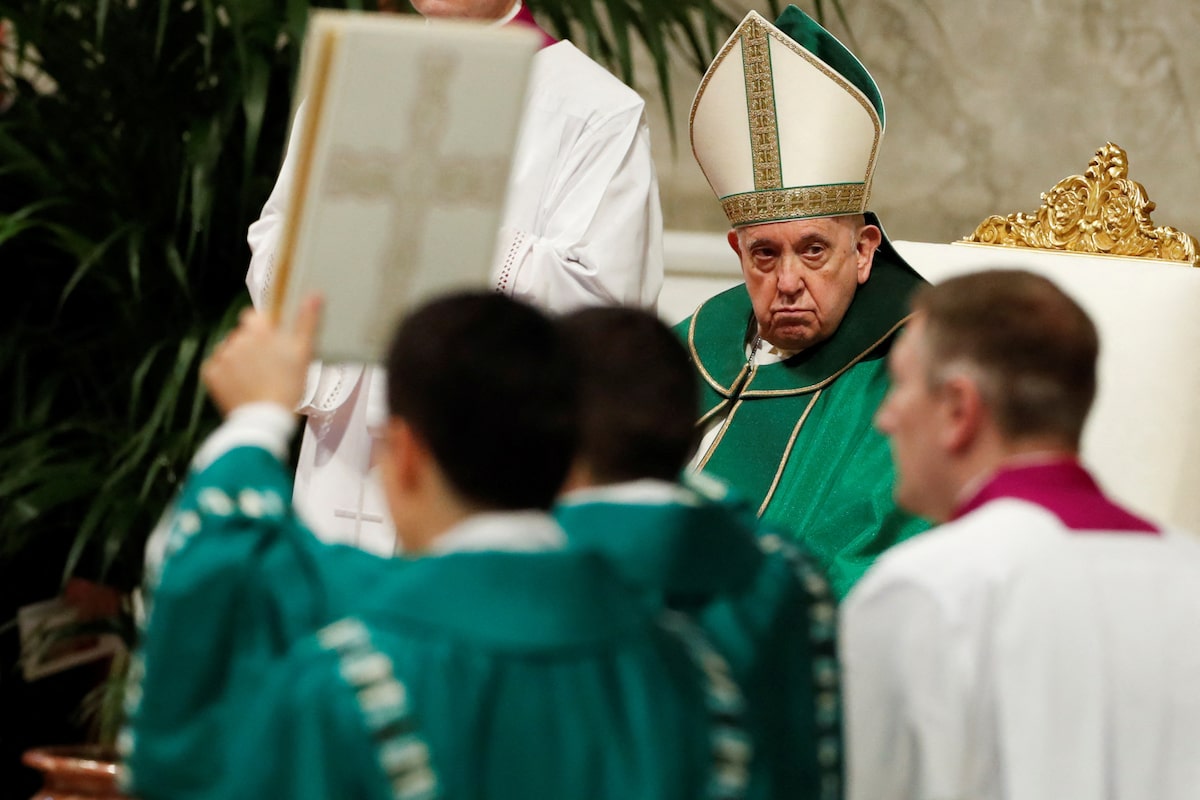Assessing Pope Francis's Papacy: The Conclave's Verdict

Table of Contents
Reform and Modernization Efforts
Pope Francis's papacy has been characterized by a significant push for reform and modernization across various aspects of the Church. This drive towards a more inclusive and socially conscious institution is arguably his most defining characteristic.
Emphasis on Social Justice and Environmental Concerns
Francis’s encyclical Laudato Si’, a powerful call for environmental stewardship and social justice, has significantly shaped the discourse surrounding climate change and poverty within and beyond the Catholic Church. His focus on caring for creation and the poor, rooted in Franciscan ideals, is evident in numerous initiatives.
- Emphasis on the poor and marginalized: Francis consistently advocates for the rights of the poor, refugees, and migrants, challenging the status quo and urging a shift towards greater economic equality.
- Laudato Si’ and its impact: This encyclical has spurred numerous environmental initiatives within Catholic institutions and inspired broader ecological movements globally. It has prompted discussions on sustainable practices and responsible consumption.
- Promoting synodality: Francis has emphasized synodality, a process of shared decision-making within the Church, promoting greater participation from lay people and local communities. This signifies a shift away from a more centralized, top-down approach.
Ecclesiastical Reforms and Governance
Pope Francis has initiated significant reforms within the Vatican's bureaucracy, aiming to enhance transparency, accountability, and efficiency. His efforts to streamline the Curia and decentralize power represent a departure from previous administrations.
- Curia reform: The restructuring of Vatican departments aims to reduce redundancies and improve collaboration. This includes creating new dicasteries and merging others.
- Financial reforms: Addressing financial irregularities within the Vatican has been a key focus, with measures introduced to improve transparency and oversight of financial matters.
- Decentralization efforts: Empowering local churches and bishops' conferences is a core component of Francis's reform agenda, aiming to make the Church more responsive to the needs of diverse communities. However, this has also faced resistance from some quarters.
Challenges and Criticisms
Despite the significant reforms undertaken, Pope Francis's papacy has faced numerous challenges and criticisms, both internally and externally.
Controversies and Internal Resistance
Significant internal resistance to his reforms stems from conservative factions within the Church who view his approach as too progressive or even heretical. This tension has played out publicly on several occasions.
- Theological debates: His emphasis on mercy and inclusivity has sparked debates among theologians and within the Church hierarchy. Certain interpretations of his teachings have faced strong opposition.
- Handling of abuse cases: Criticism of the Vatican's handling of clerical sexual abuse cases has persisted throughout his papacy, raising questions about accountability and transparency.
- Conservative opposition: Open opposition from conservative cardinals and bishops highlights the deep divisions within the Catholic Church regarding Francis’s reforms and theological perspectives.
Global Challenges and Shifting Geopolitical Landscape
Navigating complex geopolitical issues has presented significant challenges. Pope Francis's diplomatic efforts have been extensive, but the effectiveness of his interventions varies depending on the specific context.
- International relations: He has engaged with world leaders on issues such as climate change, poverty, and conflict resolution, using his moral authority to advocate for peace and justice.
- Interfaith dialogue: Francis has actively pursued interfaith dialogue, promoting understanding and cooperation between different religious communities.
- Political influence: His pronouncements on social and political issues have generated both praise and criticism, highlighting the complex relationship between the papacy and the political sphere.
Theological and Pastoral Impact
Pope Francis's papacy has profoundly influenced the theological and pastoral landscape of the Catholic Church.
Shifting Pastoral Approaches
His emphasis on mercy and inclusivity has led to a significant shift in pastoral care, particularly concerning individuals and groups previously marginalized.
- Mercy and inclusivity: His focus on mercy is evident in his outreach to various groups, including divorced and remarried Catholics, LGBTQ+ individuals, and those living on the peripheries of society.
- Pastoral care initiatives: New pastoral approaches have been implemented, emphasizing accompaniment and support rather than strict adherence to traditional norms.
- Synodality in practice: The promotion of synodality is intended to facilitate a more participatory approach to pastoral governance.
Renewed Focus on Evangelization
Francis has stressed the need for a renewed focus on evangelization, adapting the Church's missionary approach to the challenges of the 21st century.
- New evangelization strategies: He has encouraged a more inclusive and culturally sensitive approach to missionary activity, emphasizing dialogue and encounter.
- Missionary discipleship: He calls for all Catholics to become missionary disciples, actively sharing their faith in their daily lives.
- Reaching out to the peripheries: A key theme in his approach is reaching out to those on the margins of society, both geographically and socially.
Conclusion
Pope Francis's papacy represents a pivotal moment in the history of the Catholic Church. His efforts towards reform and modernization, though met with significant resistance, have undeniably left a lasting impact. While a definitive assessment of his legacy awaits future generations, the "Conclave's Verdict," though metaphorical, suggests a period of profound change. His emphasis on social justice, environmental stewardship, and a more inclusive Church has redefined the Church's role in the modern world. His papacy is a complex tapestry woven with threads of both significant progress and persistent challenges. However, his enduring legacy lies in his efforts to reorient the Church towards a more compassionate and just future. Continue the conversation! Share your thoughts on the enduring legacy of Pope Francis's papacy in the comments below.

Featured Posts
-
 Price Gouging Allegations Surface In La Following Devastating Fires
Apr 22, 2025
Price Gouging Allegations Surface In La Following Devastating Fires
Apr 22, 2025 -
 Is Google Facing Its Biggest Threat Yet A Potential Breakup Analyzed
Apr 22, 2025
Is Google Facing Its Biggest Threat Yet A Potential Breakup Analyzed
Apr 22, 2025 -
 Unintended Consequences Examining The Price Of Trumps Economic Vision
Apr 22, 2025
Unintended Consequences Examining The Price Of Trumps Economic Vision
Apr 22, 2025 -
 Stock Market Uncertainty Are Investors Betting Against The Odds
Apr 22, 2025
Stock Market Uncertainty Are Investors Betting Against The Odds
Apr 22, 2025 -
 Ai Powered Podcast Creation Transforming Repetitive Scatological Documents
Apr 22, 2025
Ai Powered Podcast Creation Transforming Repetitive Scatological Documents
Apr 22, 2025
